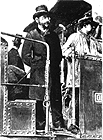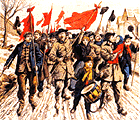Emil
ZOLA's novel "Germinal"

|
|
Realistic novel set
in the North's coalmines |
|
The author: Emil ZOLA
1840-1902 Friend of the
Impressionists His first
novels Themes of his
novels
Zola explored the political consequences: the class struggle, and the pressures to resort to violence and terrorism. He clearly took sides in the contemporary debates on:
But he fell short of advocating socialism, and his message seemed to be that workers and bosses were both being swept along by an irresistible tide of social change. Back to top Writing
'Germinal' By the time no.13 was being planned, Zola was financially prosperous. He decided to set this life-and-death conflict between labour and capital in a coal mine. Miners strikes, where strikes often involved hardship and violence; the dark tunnels of the mine offered many dramatic and symbolic possibilities. Back to top |
|
|
Research in
Valenciennes |
|
|
The novel's title came from the name of the seventh month in the Revolutionary calendar - Germinal was the period of April - May, symbolising the springtime of social revolution. . Back to top |
|
|
The strike in the
novel |
|
|
The strike was caused by conflict over pay systems. Miners were then not employed directly by the mine-owner. The leader of each 'gang' bid for a seam of coal in an auction. The gang was paid only for the coal it dug out, so they begrudged time wasted on putting up pit-props to hold up the . Tunnels often caved in, causing bad accidents. The mining company feared the whole mine would collapse, so said they would pay gangs separately for timbering work, and for coal dug out. Miners suspected it was a trick to reduce their pay, and went on strike. Zola also described the brutalising effects of women and children being employed underground, to haul away the coal as the men dug it out. He was moved by the plight of pit ponies who lived permanently in the dark tunnels down the mine. However he was to some tastes almost too impartial in portraying the owners and managers: they were "trying the best they could". They would "like to pay better wages", but competition and falling coal prices prevented them. Owners of small mines feared the financial power of big mining companies with distant uncaring shareholders. Managers were better-off, but if they gave charity to ignorant miners their handouts probably would have been wasted in a bar. Back to top The impact of the
novel The North was becoming a hot-bed of socialism, voting increasingly for left-wing MPs, town councils and mayors. Back to top |
|
|
Places to
visit: |
|
|
|
Related background
information |
|
|
|
|
|








